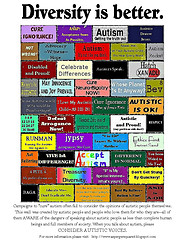I’m not sure if it’s because they’re autistic or whether it’s the speech delays or some random combination of the two, but now that they talk so much more than I ever imagined possible, far from improving our understanding of one another, it seems to make comprehension some kind of cerebral gymnastic exercise, one that I am not qualified to deal with.
For example, because examples usually clarify, I say to junior ‘go and put your shoes on now dear.’ Note the use of a statement not rather than a request, which would invoke an automatic negative response or meltdown. What kind of a response might a rational parent expect? I suspect that ‘I don’t have any shoes,’ would not be your first guess. If you had personal knowledge of our family, his aversion to texture and shoes, this might be on your radar, but that answer still wouldn’t be the words you’d expect. You might guess ‘I don’t want to wear shoes because I hate them,’ that would be o.k. and logical. The denial of the very existence of shoes, isn’t quite so high up on the expectations league, or at least not on mine.
I used to consider myself quite a linguist, agile in the word department but this doesn’t marry well with my everyday performance, or lack thereof. Time after time I am floored, defeated and dumbfounded, and that’s only within the average hour.
Whilst we skimmed over the issue of using statements rather than questions in the hope of eliciting a response, there is also the matter of giving choices, the A or B type of choice, mainly because for senior, choices are a hardship. So you say to him, ‘do you want a tangerine or grapes?’ Whilst neither are preferred, neither are they loathed, so it’s a choice between two indifferent items. Clever timing on my genius part, ensures that he is hungry before I ask the question, but food is still generally a refueling exercise rather than a social or pleasurable experience. So how will he answer? I can cope with the;
a] I don’t know
b] nuffink
c] no
those are all just fine, we’ve been having those for at least 18 months, it’s the ones that spring out of nowhere to hijack and confuse me. These can take a variety of forms such as the unexpected return question that is off topic;
“You like Pikachu or Absol bestest?” Whilst my knowledge of Pokemon and my sons’s preference for them, I did not anticipate that my question would provoke his question. Alternatively, his response might be a different question, one that refers to an incident 6 months or 6 years ago, that is not related to the current topic either;
“when I was 4 did I have an accident?’
There again we could have the relevant ‘on topic’ question, that still comes out of the clouds to zap the feeble minded brain of the adult;
“Citrus fruits are poisonous? I am gonna die!”
Am I complaining because my speech delayed non-verbal children are less so? Well yes of course I am, that’s what I’m best at afterall, but at the same time it’s such at monumental development that my brain is still lagging behind. The fact that I cannot anticipate their responses reflects my own very narrow field of expectations. It also reflects the fact that they do not have those same limitations, they literally do ‘think outside the box.’ Who wants to live in that kind of a cage anyway?
My synapses and neural pathways are strong, swift and travel over familiar well rehearsed territory. Their’s are relatively unformed, fluid and free flowing. I know where my typical conversations will end up. Conversations with my own boys are uncharted, without a script or map. But maybe it’s better for all of us to travel hopefully than to arrive?






